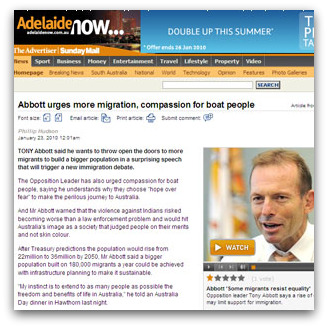 Tony Abbott's recent speech on immigration policy provides helpful material for Australia Day reflection.
Tony Abbott's recent speech on immigration policy provides helpful material for Australia Day reflection.
He simultaneously argued for a larger immigration policy and for strict controls over asylum seekers who arrived by boat. Although he expressed some sympathy for asylum seekers who had to leave their country, the heart of his speech was his claim that 'John Howard's declaration about Australians controlling who comes to this country resonated because it struck most people as self-evidently and robustly true.'
This recalled Mr Howard's own statement of principle, 'We will decide who comes to this country and the circumstances in which they come.'
Abbott was criticised in some circles for inconsistency between his immigration policy and his asylum seeker policy. But the real problem is not that he separates immigration for asylum seeker policy, but that he fuses them. This flows from the Howard principle, and saddles him with a policy towards asylum seekers that is necessarily inhumane.
John Howard's single-minded insistence on the Australian right to decide who enters the country and how they do it is plausible at first hearing, and remains an effective debating point. At one, trivial, level the statement is true. Provided that Australian supervision of entry points is reasonable and admission to citizenship is orderly, no one will enter Australia against the will of the government. That is a simple statement of fact.
The Howard principle, however, implies more than a simple statement of fact. It implies that Australia can rightly make arbitrary and inflexible decisions about who enters the country based only on its perceived self interest.
If we apply this principle to domestic situations we can see its weakness. Imagine the father of a household saying, 'We will decide who comes to our house and the circumstances in which they come'. The insistence on will and self-interest alone would not be enough. If, for example, an aged aunt walk up to the front door, half-frozen in a storm, the father could decide to send her away. But his appeal to the Howard principle would not convince us that he had acted rightly. We would expect him to give reasons for making the decision.
Nor would we be convinced if he showed us the list of conditions that visitors needed to meet before they were allowed to enter his house. He might say that only people who rang first, who were known to him, who came in the front gate would be allowed in the house.
We might regard such principles as generally helpful. But if the householder turned away a girl who came to the back door, fleeing from a man trying to assault her, we would regard his behaviour as unreasonable and inhumane. If he then expressed sympathy for her plight while justifying his decision to allow her in, we would regard him as hypocritical.
These examples show that the right to decide according to principles based on our self-interest are not adequate to establish a humane or decent policy. They need to be complemented by considering the need of the person who wishes to gain entry. People in dire circumstances make a claim on the householder that he cannot discharge simply appealing to his self-interest.
It is on the basis of need that immigrants are distinguished from refugees, and so demand a distinct policy. From the point of view of Australia's self-interest and its power to accept or refuse them, immigrants and refugees are identical. But they are differentiated by need.
If the householder were renting out rooms, for example, he would be entitled to allow general principles based on his self-interest to guide his practice. But they ought not guide his response to some in desperate need. Indeed, even in some of the decisions he made about boarders, he might have to take into account people's need. If one of the boarders fell ill and needed care, it would seem unreasonable if he refused to allow the boarder's mother to stay in a room that was available for rent.
So there is a clear distinction between the claim that immigrants and asylum seekers make on us. This difference makes the Howard principle inadequate in the case of asylum seekers because it appeals to power and to self-interest alone. It ignores need. It fails to recognise that many immigration cases also involve need.
Certainly, the Howard principle is neither self-evident nor true. It is less robust than brutal. On Australia Day both the Coalition and Australian people deserve a better basis for policy.
 Andrew Hamilton is the consulting editor for Eureka Street. He teaches at the United Faculty of Theology in Melbourne.
Andrew Hamilton is the consulting editor for Eureka Street. He teaches at the United Faculty of Theology in Melbourne.